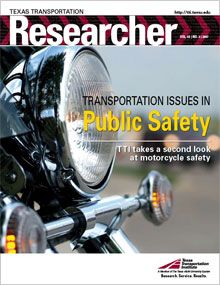Multiple TTI efforts helping to curb impaired driving
 The statistics are sobering: According to the National Highway Traffic Safety Administration (NHTSA), in 2005 there were 1,569 alcohol-related traffic deaths in Texas. Nearly half of all total traffic deaths in the state were alcohol-related. If eleven 737 passenger jets filled to capacity crashed with no survivors, the number of casualties would still not come close to those killed in alcohol-related vehicle crashes.
The statistics are sobering: According to the National Highway Traffic Safety Administration (NHTSA), in 2005 there were 1,569 alcohol-related traffic deaths in Texas. Nearly half of all total traffic deaths in the state were alcohol-related. If eleven 737 passenger jets filled to capacity crashed with no survivors, the number of casualties would still not come close to those killed in alcohol-related vehicle crashes.
Though alcohol-related deaths in Texas and across the country are not a new problem, the need to act is more urgent than ever. Researchers at the Texas Transportation Institute (TTI) are working with staff from the Texas Department of Transportation (TxDOT) and other agencies on several projects to address the problem of driving under the influence.
“A significant TxDOT project is establishing the Texas Statewide Impaired Driving Working Group (TSIDWG),” says TTI Research Scientist Melissa Walden.
The TSIDWG is a multi-disciplinary working group that acts as a strategic planning body in the area of impaired driving program development. As subject matter experts, group members provide input and recommend changes to the Texas Impaired Driving Program. In order to ensure the products of the group are beneficial, TTI coordinates the TSIDWG and develops policy statements along with data analysis.
“The most important thing about this group is that we take a holistic approach toward looking at impaired driving. We include the entire process from enforcement, prosecution, adjudication, licensing, community involvement as well as state law,” says Walden.
The group is also working to develop a training course curriculum to update police officers about methods of conducting standardized field sobriety tests. A newly enacted state requirement mandates that law enforcement officers must undergo training every two years to maintain their certification as a Standardized Field Sobriety Testing (SFST) instructor, but currently there is no standardized training course available for officers. Working with TxDOT, TTI will bring together experts to develop a training course that can be used by law enforcement agencies throughout the state.
TTI is also assessing the operation of the current alcohol ignition interlock program in Texas. An ignition interlock is a system that tests for alcohol on a driver’s breath. It requires a vehicle operator to blow into a small, handheld alcohol sensor that is attached to a vehicle’s dashboard. The car cannot be started if the driver’s blood alcohol content is above the legal limit. Although ignition interlocks have been in use in Texas for many years, a comprehensive evaluation of the program has not been conducted.
TTI is also working with Sam Houston State University to deploy and evaluate a new program called the Advanced Roadside Impaired Driving Enforcement Program (ARIDE). “This program is a step beyond the SFST program and helps officers recognize signs and symptoms associated with drug impairment that they may be observing in the field,” says Walden. “This knowledge will allow the officer to make an informed decision as to what type of test (breath or blood) should be administered. All of these initiatives are deployed to help reduce the number of impaired driving crashes in the state each year.”
